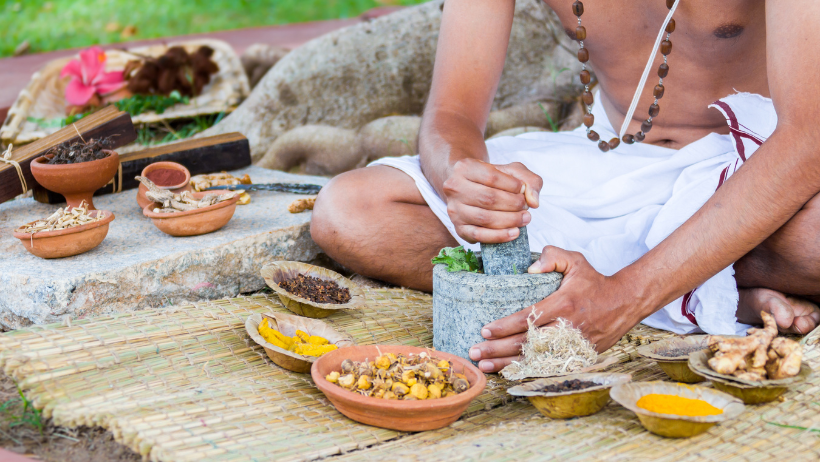
Ayurvedic Medicine: Digging Deeper to Understand Your Dominant Dosha
The background information in Howler’s last two articles about Ayurvedic medicine set the stage for what we’ll cover this time. In part 1, we identified the three doshas — vata, pitta and kapha — and then provided a quiz to determine which of your own doshas is dominant. Part 2 focused on the three energies and five elements in relation to Ayurvedic principles.
Now, I will put it all together and continue sharing more details about each one of the doshas. Again, if you have not taken the quiz in part 1, or need to refresh your memory, I encourage you to revisit that article.
What’s true for you?
So, do you remember that all of us have the three doshas in different proportions? However, for most people one dosha is usually dominant.
Keep reading and see if you can apply this information to your own body.
Vata: air + ether
When in balance, people with a predominant vata have excellent agility, dry skin and hair, and a thin frame. They are creative, energetic and flexible, loving excitement and new experiences.
When out of balance, those with a predominant vata tend to have hypertension, constipation, weight loss, weakness and arthritis. They may be prone to worry, insomnia and digestive challenges.
To keep vata in balance it is suggested that the following fruits are preferably avoided:
Generally most dried fruit, apples (raw), cranberries, dates (dry), figs (dry), pears, persimmons, pomegranates, raisins (dry), prunes (dry) and watermelon.
In order to stay balanced, the following fruits are suggested:
Generally most sweet fruit, apples (cooked), applesauce, apricots, avocado, bananas, berries, cherries, coconut, dates (fresh), figs (fresh), grapefruit, grapes, kiwi, lemons, limes, mangoes, melons, oranges, papaya, peaches, pineapple, plums, prunes (soaked), raisins (soaked), rhubarb, strawberries and tamarind,
Pitta: fire + water
When predominant pitta people are in balance, they have perfect digestion, a lustrous complexion and strong appetite. They are receptive to praise, sharp-witted, direct and outspoken.
When out of balance, they tend to have skin rashes, indigestion, excessive body heat and burning sensations. They are short-tempered and argumentative.
To keep pitta balanced, the following fruits must be avoided:
Generally most sour fruit, apples (sour), apricots (sour), bananas, berries (sour), cherries (sour), cranberries, grapefruit, grapes (green), kiwi,** lemons, mangoes (green), oranges (sour), peaches, persimmons, pineapple (sour), plums (sour), rhubarb and tamarind.
And the following fruits help to balance the pitta dosha:
Generally most sweet fruit, apples (sweet), applesauce, apricots (sweet), avocado, berries (sweet), cherries (sweet), coconut, dates, figs, grapes (red and purple), limes,* mangoes (ripe), melons, oranges (sweet),* papaya,* pears, pineapple (sweet),* plums (sweet), pomegranates, prunes, raisins, strawberries* and watermelon.
Kapha: water + earth
Predominant kaphas in balance have excellent stamina, large and soft eyes, a strong build, thick hair and smooth skin. They are loyal, patient, steady and supportive.
When out of balance they sleep excessively and have overweight issues. They suffer from asthma, depression, diabetes, resistance to change and stubbornness.
What fruits to avoid for kapha:
Generally most sweet and sour fruit, avocado, bananas, coconut, dates, figs (fresh), grapefruit, kiwi, mangos,** melons, oranges, papaya, pineapple, plums, rhubarb, tamarind and watermelon.
Beneficial fruits for kapha:
Generally most astringent fruit, apples, applesauce, apricots, berries, cherries, cranberries, figs (dry),* grapes,* lemons,* limes,* peaches,* pears, persimmons, pomegranates, prunes, raisins and strawberries.
* okay in moderation
** okay rarely
And, as you might suspect, there are lists of vegetables, grains, condiments, legumes, animal foods, seeds, etc. that will help to bring back into balance a specific dosha. Or there are foods that must be avoided or ingested with moderation.
I invite you to look into this information and make an online search about the foods to avoid and the foods that bring balance. In this way you can experience for yourself the benefits of balancing your dosha with specific foods.
